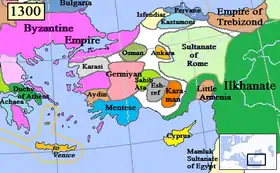كرمايان
إمارة كرمايان (بالتركية: Germiyanoğulları Beyliği)، وتُنطق «جرمِيان» (جيم غير معطشة)، هي إحدى إمارات الأناضول التي نشأت في فترة انحلال دولة سلاجقة الروم، وقد اتخذوا من مدينة كوتاهيا عاصمة لهم. تعود أصول هذه الإمارة إلى الكرد [1] أو من مزيج من قبائل الكرد والأويغور.[2][3][4][5]
| كرمايان | |
|---|---|
 | |
| الأرض والسكان | |
| عاصمة | كوتاهية |
| الحكم | |
| التاريخ | |
| تاريخ التأسيس | 1300 |
جزء من سلسلة حول |
|---|
| تاريخ تركيا |
 |
| التسلسل الزمني |
| بوابة تركيا |
وخلال فترة قصيرة من النصف الثاني القرن الرابع عشر كانت هذه الإمارة القوة الثانية في المنطقة بعد إمارة قرمان، لكن فيما بعد تم غزو أراضيهم من قبل جيرانهم بنو عثمان والذين أنشأوا لاحقاً الإمبراطورية العثمانية.
لعب بنوا كرمايان دوراً هاماً في توطين الترك الغزيين على طول سواحل بحر إيجة.
قائمة الحكام
| التاريخ[6] | اسم الحاكم | |||
|---|---|---|---|---|
| 1260-1264 | كريم الدين علي شير بن مظفر الدين بن علي شير | |||
| 1264-1325 | يعقوب بك الأول بن علي شير بن مظفر الدين بن علي شير | |||
| 1325-1360 | محمد بك بن يعقوب | |||
| 1360-1387 | سليمان شاه بن محمد | |||
| 1387-1390 | يعقوب بك الثاني بن سليمان | |||
| 1390-1402 | الضم إلى الدول العثمانية. | |||
| 1402-1411
1413-1429 |
يعقوب بك الثاني بن سليمان | |||
| 1429 | الضم النهائي إلى الدولة العثمانية | |||
- الأصهار يمنحون لقب داماد
انظر أيضًا
- دولت شاه خاتون ابنة سليمان شاه بن محمد الكرماياني، زوجة السلطان العثماني بايزيد الأول.
المراجع
- Michael Broome, 1985 , A handbook of Islamic coins, p. 132, Seaby, University of Michigan, 230 pages, ISBN 0-900652-66-7, ISBN 978-0-900652-66-0, Further west the Eshref and the Kurdish tribe of Germiyan watched each other uneasily with the Ottomans in the north-west and the Menteshe in the south-west threatening the remaining enclaves of Byzantine territory at Nicaea and Smyrna
- Ducas, Harry J. Magoulias, Ducas, 1975 , Decline and fall of Byzantium to the Ottoman Turks, p. 265, Wayne State University Press, University of Virginia, 346 pages, ISBN 0-8143-1540-2, ISBN 978-0-8143-1540-8, The Germiyan were probably Kurdish and Turkish half-breeds who came from east of Malatya.
- Peter Malcolm Holt, 1986, The Age of the Crusades: the Near East from the eleventh century to 1517, p. 176, Longman, University of Michigan, ISBN 0-582-49303-X, 9780582493032, 250 pages, The second of the eastern principalities, Germiyan, developed from a group, probably of mixed Kurdish and Turkish origin
- Marios Philippides, Biblioteca apostolica vaticana - 1990, Byzantium, Europe, and the early Ottoman sultans, 1373-1513: an anonymous Greek chronicle of the seventeenth century, p. 6, A.D. Caratzas, University of Michigan, ISBN 0-89241-430-8, ISBN 978-0-89241-430-7, Near Byzantine borders in Phrygia, the emirate of Germiyan was formed by a mixed population of Turks and Kurds, who had come from east of Malatya
- Carl F. Petry, 1998, The Cambridge History of Egypt, Volym 1, p. 527 , Cambridge University Press 672 pages, ISBN 0-521-63313-3, ISBN 978-0-521-63313-0, An Anatolian Turko-Kurdish dynasty, with its capital at Kutahya
- Liste établie d'après (بالإنجليزية) "Germiyanogullari Principality".
{{استشهاد ويب}}: يحتوي الاستشهاد على وسيط غير معروف وفارغs:|month=و|citation=(مساعدة) نسخة محفوظة 20 ديسمبر 2005 على موقع واي باك مشين.
- بوابة دول
- بوابة الدولة العثمانية
- بوابة تركيا
- بوابة التاريخ
- بوابة الدولة السلجوقية
This article is issued from Wikipedia. The text is licensed under Creative Commons - Attribution - Sharealike. Additional terms may apply for the media files.
